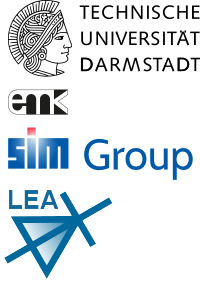

Technische Universität Darmstadt
www.tu-darmstadt.deFachgebiet Mikrotechnik und Elektromechanische Systeme,
Institut für Elektromechanische Konstruktionen,
Technische Universität Darmstadt
The Institute of Electromechanical Design (EMK) of the Technische Universität Darmstadt was founded in 1963. The research work at the institute for EMK is concentrated on topics in the field of microtechnology, microactuators, measurement and sensor technology, the methodology of development and manufacturing processes. Thereby the medical engineering prioritizes. The research activities at the Laboratory Microtechnology and Electromechanical
Systems (M+EMS) are focused on Micromechatronics, Microsystems Technology and Electroactive Polymers.
www.etit.tu-darmstadt.de/mems
Fachgebiet Simulation, Systemoptimierung und Robotik (SIM),
Fachbereich Informatik,
Technische Universität Darmstadt
The Simulation, Systems Optimization and Robotics Group (SIM) of Technische Universität Darmstadt's Department of Computer Science conducts research on cooperating autonomous mobile robots, biologically inspired robots and numerical optimization and control methods. Its research has been funded through more than 30 projects by national, European and US research agencies. The research results have received several awards including the first prize of the European EURON/EUROP Robotics Technology Transfer Award, the Hessian Cooperation Award, the Louis Vuitton Best Humanoid Award and successes in numerous international competitions for autonomous mobile robots including several of the most relevant for collaborative and autonomous robots in harsh environments (e.g, ARGOS Challenge, ENRICH, RoboCup Rescue and Soccer, World Robot Summit).
www.sim.informatik.tu-darmstadt.de
Fachgebiet Leistungselektronik und Antriebsregelung,
Technische Universität Darmstadt
The Institute for Power Electronics and Control of Drives, is active within two main areas: 1. Interaction between Power Electronics and Power Grid: The power grid and the power quality is essentially influenced by Power Electronic systems and components. This interaction will increase with a higher amount of renewable infeed. The Institute is working on the following topics: Stability of power grids and suppression of harmonics, Island operation and black-start capability, Common mode signal propagations. 2. Smart electrical drive systems: The research is focused on the precise torque and position control of electrical machines be using model predictive control schemes. With this approach a flexible optimization of the drive system can be achieve depending on the application.
www.lea.tu-darmstadt.de
